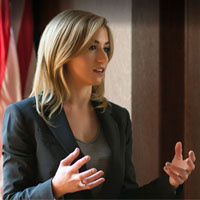 Toughkenamon Misdemeanor Lawyers, Pennsylvania
Toughkenamon Misdemeanor Lawyers, Pennsylvania
Sponsored Law Firm
-
 x
x

Click For More Info:
-
The McGarrigle Law Firm
1500 Walnut Street, 22nd Floor Philadelphia, PA 19102» view mapWhite Collar Crime, Criminal Appeals, DUI&DWI Trial Experience & Zealous Advocacy
The Firm’s devoted attention to your individual concerns, our vast trial experience in all types of criminal matters, and our skillful advocacy will ensure that your rights are protected.
800-934-5330
Sponsored Lawyers
1-5 of 5 matches
Criminal, Felony, Misdemeanor, DUI-DWI, White Collar Crime
Zak Goldstein is a Philadelphia criminal defense and civil rights attorney. Zak Goldstein has experience trying hundreds of cases before judges and juries, and he has represented clients in both state and federal court. He has successfully obtained full acquittals for his clients in both bench and jury trials. When appropriate, he has also been able to obtain favorable non-trial dispositions such as the dismissal of charges, entry into diversionary programs, or negotiated pleas to significantly reduced charges. Prior to entering private practice, Zak Goldstein was an Assistant Defender with the Defender Association of Philadelphia; one of the most well regarded and highly trained public defender offices in the country. As a defender, he represented thousands of clients charged with crimes ranging from simple misdemeanors to the very most serious and complex felonies. After leaving the Defender Association, he worked as an associate for a nationally recognized AmLaw 200 law firm specializing in complex civil litigation. Zak Goldstein started his own practice because he is passionate about defending the constitutional rights of the accused and helping victims of police misconduct obtain justice. He is an experienced advocate who will fight hard for your rights in order to make sure that you have every possible advantage when dealing with the power of the police and the prosecutor. Zak Goldstein is an award winning criminal defense attorney. He is ranked as a Top Attorney in Criminal Defense with the highest Avvo rating of Superb. He was also recently selected as one of the National Trial Lawyers: Top 40 under 40 in criminal defense. Attorney Goldstein graduated summa cum laude from Moravian College with a degree in Economics and a minor in Spanish. He graduated magna cum laude from Villanova University School of Law, where he was an associate editor of the Villanova Law Review. During law school, Mr. Goldstein completed internships with the Philadelphia District Attorney’s Office and a boutique law firm specializing in white collar criminal defense. Attorney Goldstein is admitted to practice law in Pennsylvania, New Jersey, and the Eastern District of Pennsylvania. He is an active member of the legal community, and he maintains memberships in the Pennsylvania Association of Criminal Defense Lawyers, the Philadelphia Criminal Law Inn of Court, the American Bar Association, the New Jersey State Bar Association, and the Philadelphia Bar Association.
(more)Criminal, Police Misconduct, Felony, Misdemeanor, DUI-DWI
Attorney Lauren A. Wimmer has represented individuals charged in both state and federal court with charges ranging from misdemeanors like drug and various weapons offenses to felony crimes like homicide, aggravated assault, and robbery. After years of experience as the judicial law clerk to a judge in the Philadelphia Court of Common Pleas, Criminal Trial Division (Homicide), Lauren A. Wimmer developed a complete understanding of how the system works, what tactics the prosecuting attorney may use to put you behind bars, and what weaknesses to look for in physical evidence and witness testimony against you. Attorney Lauren Wimmer is a tireless and successful advocate – let her fight for you. Lauren A. Wimmer earned her law degree from Rutgers University School of Law – Camden, where she was the Managing Articles Editor for the Rutgers Journal of Law & Public Policy, President of the Women’s Law Caucus, and co-chair of the Mary Philbrook Public Interest Awards. During law school, Ms. Wimmer worked as an extern in the United States Attorney’s Office for the Eastern District of Pennsylvania and as a Legal Services Coordinator for Philadelphia Volunteer Lawyers for the Arts. She was awarded “Best Brief” in the Judge James Hunter III Moot Court Competition and served as the research assistant to Professor J.C. Lore, Director of Trial Advocacy and co-author of one of the country’s leading books on trial advocacy. Upon graduation, Ms. Wimmer earned the National Association of Women Lawyers Award and the Pro Bono Publico Award. Ms. Wimmer is licensed to practice law in Pennsylvania and New Jersey. She is a member of the National Organization for the Reform of Marijuana Laws (NORML), the Pennsylvania and New Jersey State Bar Associations, the Philadelphia Bar Association, the Pennsylvania Association of Criminal Defense Lawyers (PACDL), and the Association of Criminal Defense Lawyers of New Jersey (ACDL-NJ).
(more)Criminal, Personal Injury, Police Misconduct, Misdemeanor




 Daniel McGarrigle Philadelphia, PA
Daniel McGarrigle Philadelphia, PA TestimonialsRecent Reviews
TestimonialsRecent Reviews Contact UsCall or Email
Contact UsCall or Email



